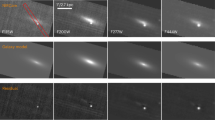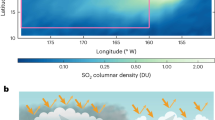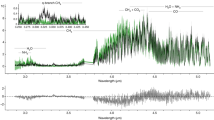Abstract
INTERGALACTIC gas clouds at high redshifts have element abundances that are close to primordial. The ratio of deuterium to hydrogen (D/H) within such clouds—which is determined from absorption lines in the spectra of more distant quasars that lie along the same line of sight—provides the best estimate of the density of baryons (ΩB) in the Universe. Previous estimates of D/H in the early Universe have yielded values that differ by about an order of magnitude1–7, with the lower values6,7 implying a high density of baryons that may be difficult to reconcile with both estimates of the primordial abundances of other light elements (especially 4He) and the known number of light neutrinos8–10. The accuracy of such D/H determinations is heavily dependent on the inferred column density of neutral hydrogen in the absorbing clouds. Here we report an independent measurement of the neutral hydrogen column density in the cloud towards the quasar Q1937 – 1009, for which one of the low D/H values was derived6. Our measurement requires a substantial revision to the D/H value reported previously; we obtain a lower limit of D/H > 4 × 10−5 for this cloud, which implies ΩB <0.016 for a Hubble constant of 100 km s−1 Mpc−1. This reduced upper limit for the baryon density relieves any conflict with standard Big Bang nucleosynthesis6.
This is a preview of subscription content, access via your institution
Access options
Subscribe to this journal
Receive 51 print issues and online access
$199.00 per year
only $3.90 per issue
Buy this article
- Purchase on Springer Link
- Instant access to full article PDF
Prices may be subject to local taxes which are calculated during checkout
Similar content being viewed by others
References
Songaila, A., Cowie L. L., Hogan, C. J. & Rugers, M. Nature 368, 599–603 (1994).
Carswell, R. F. et al. Mon. Not. R. Astron. Soc. 268, L1–L4 (1994).
Wampler, E. J. et al. Astron. Astrophys. 316, 33–42 (1996).
Rugers, M. & Hogan, C. J. Astrophys. J. 459, L1–L4 (1996).
Rugers, M. & Hogan, C. J. Astron J. 111, 2135–2140 (1996).
Tytler, D., Fan, X.-M. & Burles, S. Nature 381, 207–209 (1996).
Burles, S. & Tytler, D. Science (submitted).
Fields, B. D., Kainulainen, K., Olive, K. A. & Thomas, D. New Astron. 1(1), 77–96 (1996).
Steigman, G. The Crisis Confronting Standard Big Bang Nucleosynthesis in Critical Dialogs in Cosmology (Princeton Univ. Press, in the press).
Hata, N., Steigman, G., Bludman, S. & Langacker, P. Phys. Rev. D. (in the press).
Wampler, E. J. Nature 383, 308 (1996).
Press, W. H. & Rybicki, G. Astrophys. J. 414, 64–81 (1993).
Madau, P. et al. Preprint STSc-1085 (Space Telescope Science Institute).
Tytler, D. & Buries, S. in Origin of Matter and Evolution of Galaxies in the Universe '96 (eds Kajino, T., Yoshii, Y. & Kubono, S.) (World Scientific, Singapore, in the press).
Author information
Authors and Affiliations
Rights and permissions
About this article
Cite this article
Songaila, A., Wampler, E. & Cowie, L. A high deuterium abundance in the early Universe. Nature 385, 137–139 (1997). https://doi.org/10.1038/385137a0
Received:
Accepted:
Issue Date:
DOI: https://doi.org/10.1038/385137a0
Comments
By submitting a comment you agree to abide by our Terms and Community Guidelines. If you find something abusive or that does not comply with our terms or guidelines please flag it as inappropriate.



